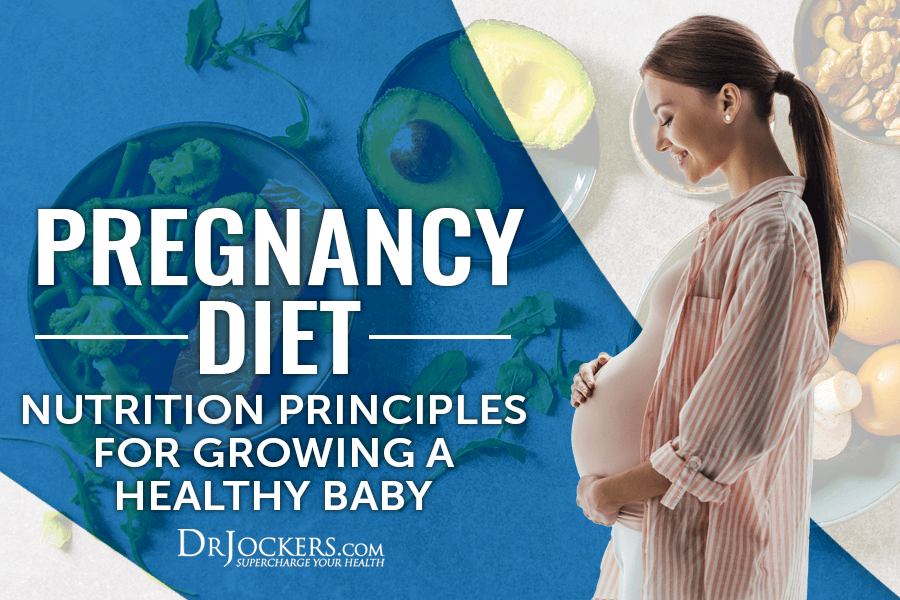 Pregnancy Diet: Nutrition Principles for Growing a Healthy Baby
Pregnancy Diet: Nutrition Principles for Growing a Healthy Baby
Following a healthy diet during pregnancy is something people talk about all the time. Yet, many don’t know what a healthy pregnancy diet looks like. Many think that eating lots of calories, taking prenatal vitamins, and listening to those odd pregnancy cravings is enough. The truth is, there is a bit more to an optimal pregnancy diet that supports a healthy pregnancy and birth.
If you are pregnant, it is important that you follow certain nutrition principles for growing a healthy baby. Today, I want to talk about these nutrition principles and a healthy pregnancy diet. These are the very same strategies that my wife, Angel is following. She is currently expecting our fourth child and her and our growing daughter’s health is our priority. I also recommend these nutrition strategies to all my patients, friends, and family.
In this article, you will learn why it is important to eat healthy during pregnancy. You will learn what foods to avoid and what foods to eat during your pregnancy. I will share the top teas that can be beneficial during pregnancy. I will share the top supplements for a healthy pregnancy. You will learn what herbal supplements you need to avoid. Following the nutrition principles of this pregnancy diet, you can be sure that you are supporting the growth of a healthy baby.
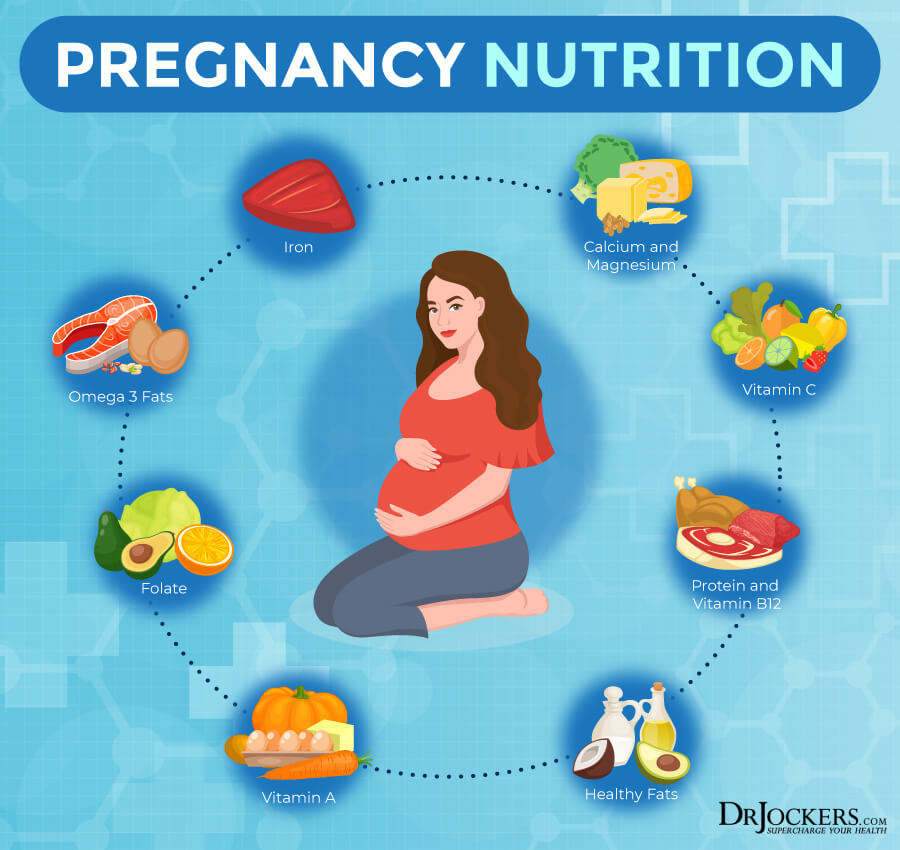
Why It Is Important to Eat Healthy During Pregnancy
When you get pregnant, your body’s macronutrient and micronutrient needs shift. As a 2018 study published in Nutrients discusses, women need to make changes to their diet to ensure a healthy pregnancy, reduce the risk of harm to the growing baby, and provide key nutrients to them (1).
While you may naturally feel how to alter your diet, it’s very important that you are mindful and understand what your body and growing baby needs during pregnancy. Remember, you are eating for two human beings. Your baby relies on the food you eat to receive all their calories, macronutrients, vitamins, minerals, and fluids.
Brain Development
Throughout your pregnancy, a fertilized egg develops into a small human being that can eventually survive and thrive outside the womb after 9 months inside. One of the most important things that take place during your pregnancy, especially in the last trimester, is brain development. During pregnancy, the brain changes from a smooth, bi-lobed, and relatively non-complex organ that resembles an adult brain.
According to a 2018 study published in Acta Pediatrica, nutritional deficiencies can seriously impact the brain development of a fetus and can lead to long-term risks and consequences (2). You need plenty of protein for structure, growth, and neuro factors, omega-3 fatty acids for membrane integrity and signaling, glucose for energetics, iron for energetics, mono-amine neurotransmission. and myelination, zinc for growth factors and synapse efficiency, copper for energy, neurotransmission, and myelination, iodine for energy metabolism, myelination, synaptogenesis, vitamin B12 for myelination and neuronal structure, and choline for neurotransmitters and myelination.
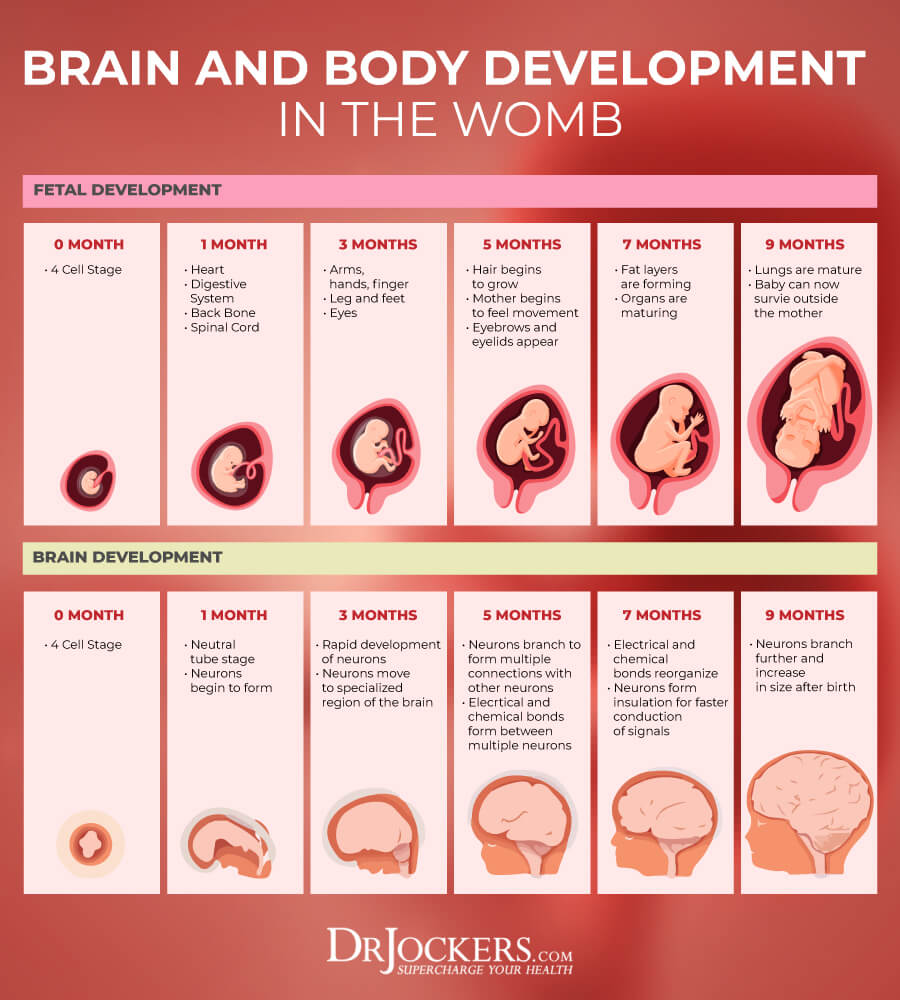
Organ Development
The brain is not the only organ developing during pregnancy. Including the heart, lungs, intestines, stomach, liver, kidneys, and nervous system. All these organs depend on the nutrients you eat during pregnancy. Vitamin D and calcium are some of the most important nutrients necessary for organ development. According to a 2018 study published in Frontiers in Endocrinology, adequate levels of vitamin D is critical for healthy development and avoiding health risks (3).
According to a 2004 study published in The Journal of Nutrition, nutrition during pregnancy can impact developmental adaptations and structure and reduce the risk of certain diseases, including cardiovascular, metabolic, and endocrine diseases (4). On the other hand, undernutrition can lead to intrauterine growth retardation, which refers to a much lower (10 percent or less) than the necessary fetal weight and a high risk of fetal morbidity.
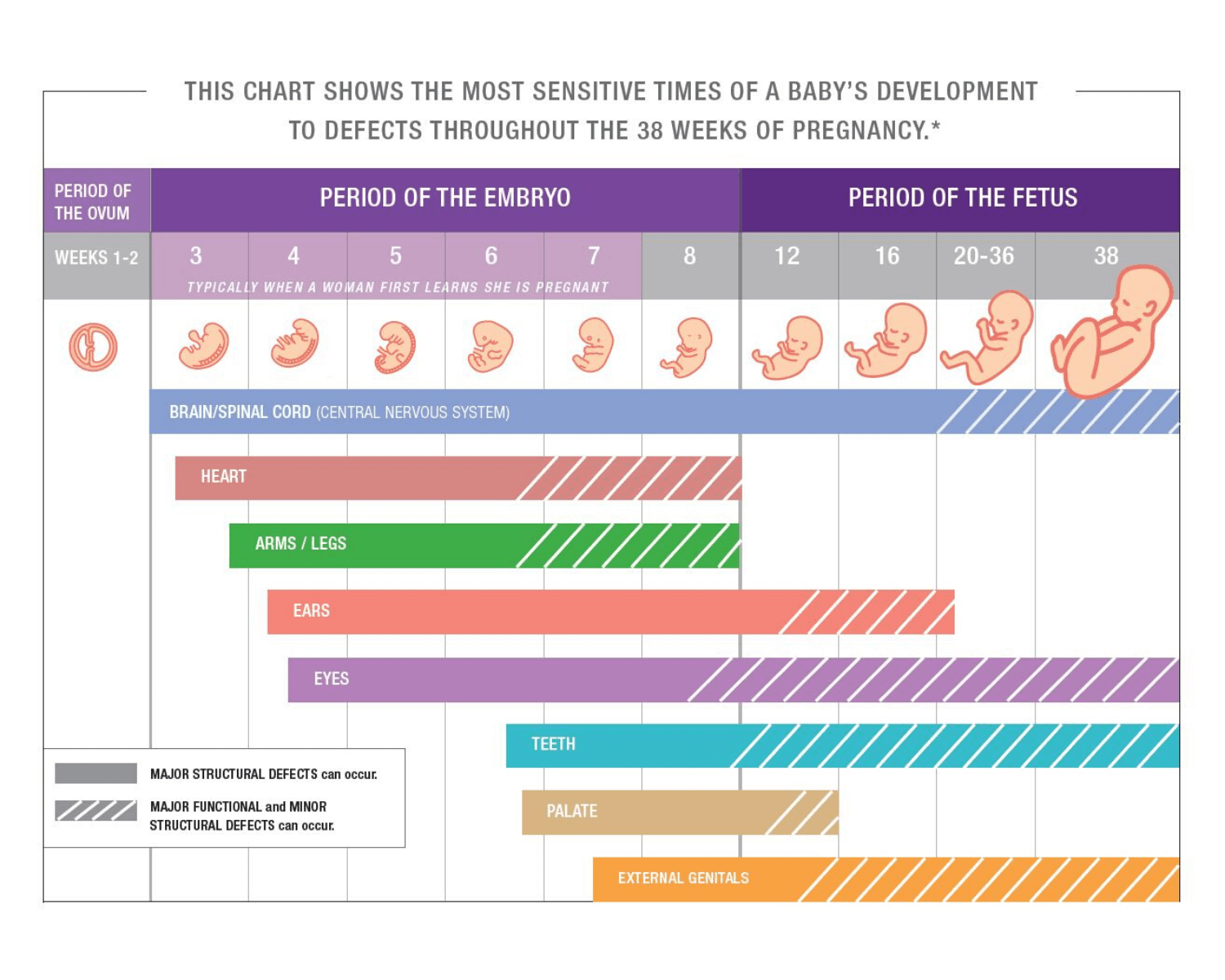
Proper Birth Weight
Restricting calories, consuming too few nutrients, and not gained enough weight during pregnancy can result in low birth weight. It can increase the risk of delivery issues and the need for a Cesarean section. It can also affect your baby’s health after delivery and even long-term. Birth weight can turn into a problem for a variety of reasons.
Eating enough is not enough calories, you need to eat healthy nutrients. Meeting or exceeding your caloric needs by eating too many inflammatory and processed foods and not getting enough nutrients can become a serious problem.
Eating too many empty calories but not enough nutrients can result in a baby that’s too big, which can also result in delivery complications and the risk of a Cesarean section. According to a 2000 study published in the Journal of Prenatal Medicine, women who gained over 35 pounds during their pregnancy were more likely to have babies with higher than infant birth weights (5).
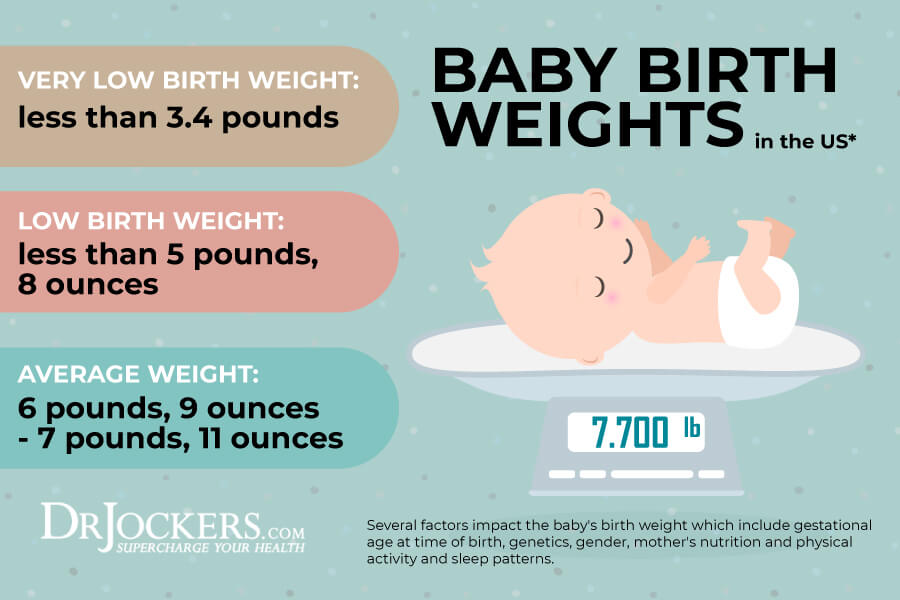
Mental Health
Since your pregnancy nutrition affects your baby’s brain and nervous system development, it is not surprising that your diet may also impact the mental health of your future child. According to a 2013 prospective cohort study published in the Journal of the American Academy of Child and Adolescent Psychiatry, eating an excessive amount of unhealthy foods during pregnancy can increase the risk of and lead to emotional and behavioral problems in children that may be observed within the first five years (6). The study has also found that postnatal nutrition is just as important for mental health.
Again, mental health and behavioral problems won’t appear until after birth and usually not until the first year or two. Yet, your pregnancy diet can seriously impact your child’s mental health during their early years and after. You need to make sure that you not only follow a nutritious diet during pregnancy but while breastfeeding and continue them on a healthy nutrition plan as they start moving onto food besides breastmilk.
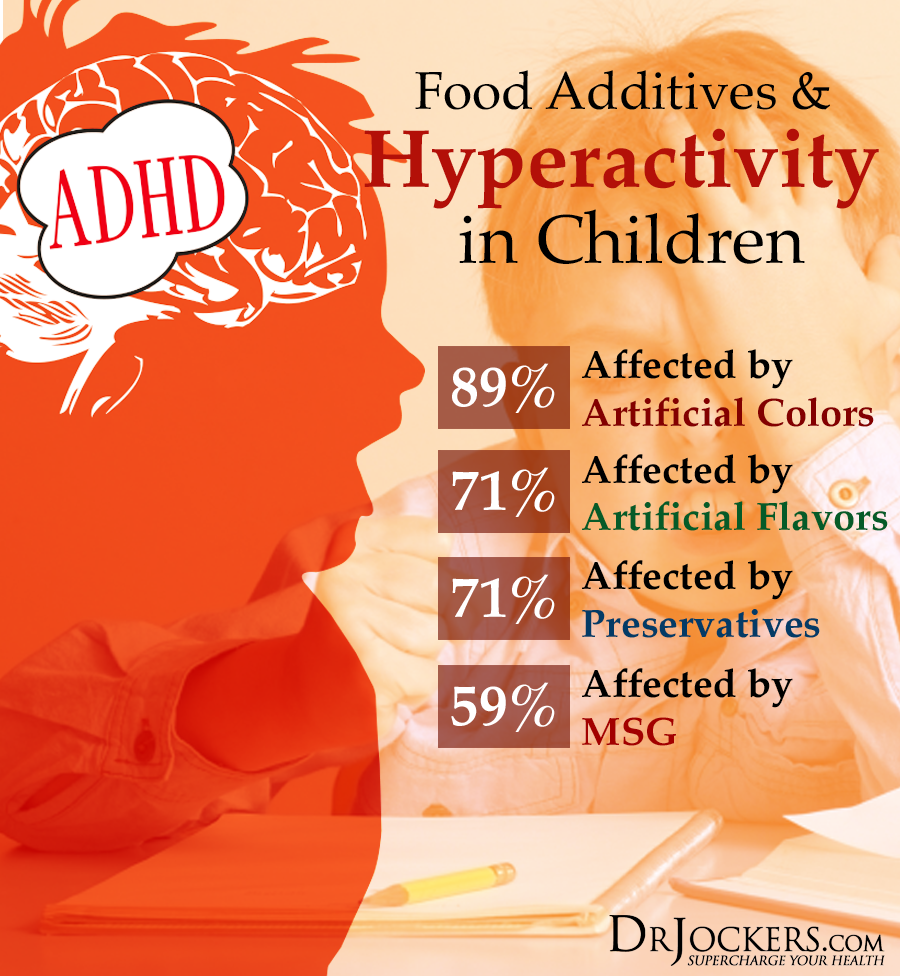
Eating Habits
It may be surprising, but your diet during pregnancy can set the stage for your child’s future eating habits. It may contribute to openness to food, fussy eating, and food preferences. According to a 2008 study published in The Journal of Law, Medicine, and Ethics, your diet and food choices during pregnancy may affect your child’s acceptance of solid foods (7).
Your baby first experiences tastes, smells, and flavors through the amniotic fluid even before birth. If they recognize a certain food that they were exposed to in the womb, they may be more likely to eat them without issues. Eating a nutrient-dense, balanced, and diverse diet can help increase your baby’s acceptance of new foods. This is, of course, not only great for your child’s diet and health but also reduces the stress from you, as a parent, when introducing new foods.

Long-Term Health
Pregnancy only lasts for 9 months, yet it can impact your child’s long-term health. While your immediate priority is probably your and your baby’s health for these 9 months and healthy birth, you need to think about long-term health well-after birth.
Health and development during this stage can even affect their health in adulthood. According to a 2006 review published in The Journal of Perinatal Education, not meeting adequate maternal nutrition needs during the first trimester may increase the risk of the baby of a variety of chronic illnesses in adulthood, including hypertension, heart disease, heart attacks, stroke, and diabetes (8).

The Health of the Mother
Your pregnancy diet doesn’t only affect your growing baby’s health and well-being, but yours as well. Your health is, of course, personally important to you, but it’s critical for your growing child as well. Your health allows them to stay safe, grow, and thrive. Poor food choices can increase the risk or symptoms of morning sickness, fatigue, heartburn, digestive issues, and swelling.
According to a systematic review and meta-analysis published in BMC Medicine, poor nutrition, and nutrient deficiencies can increase the risk of iron deficiency, anemia, high blood pressure, and pregnancy complications (9). A nutritious pregnancy diet can also reduce the risk of gestational diabetes, preterm labor, and according to a 2013 study published in Nutritional Research Reviews, the development of postpartum depression (10). Getting enough zinc, vitamin D, and selenium is particularly important for the prevention of postpartum depression.
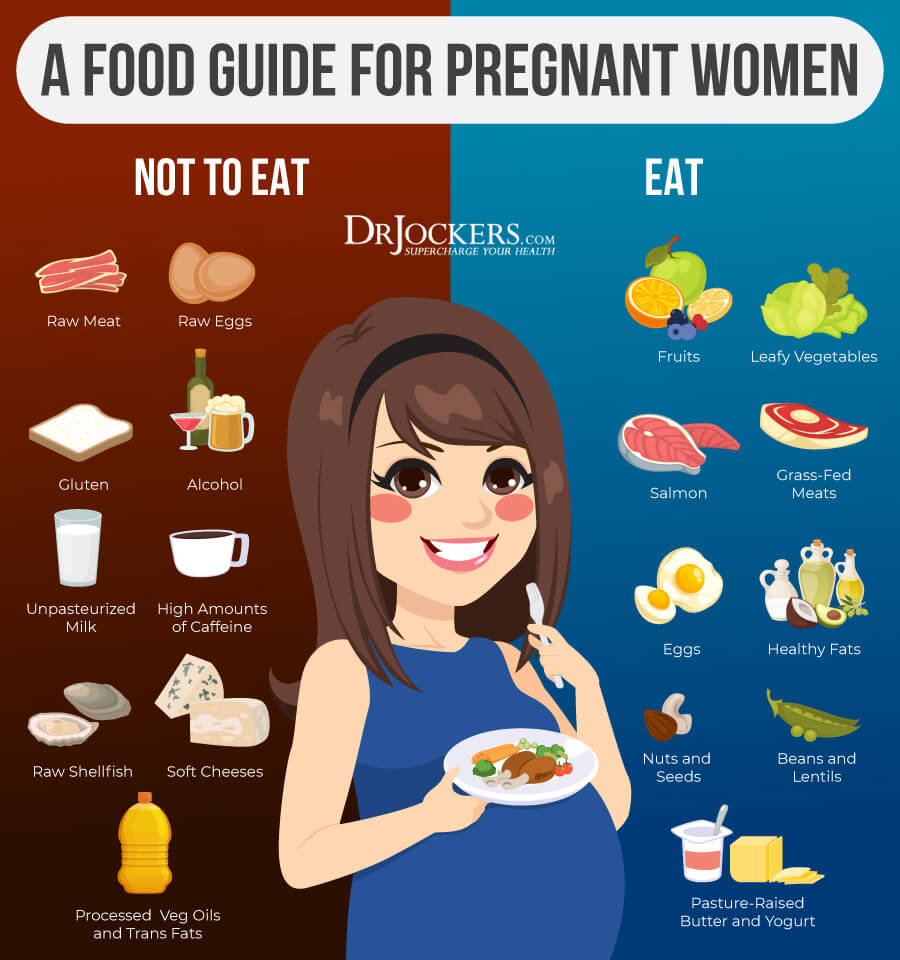
What to Avoid When Pregnant
When thinking about the nutrition principles of your pregnancy diet, it’s important to start with foods that you should avoid when pregnant. Your intuitions and food aversions may naturally tell you to stay away from certain foods, but being aware and mindful is important. These are the foods you want to avoid when pregnant.
Lunch Meat & Undercooked Meat & Seafood
If you are pregnant, you want to avoid lunch and deli meat and undercooked meat and seafood. According to the American Pregnancy Association, deli and lunch meats can sometimes be contaminated with listeria (11). According to a 2017 study published in mBio, listeria can lead to miscarriage, especially during the first trimester. It can infect the baby, cause an infection, lead to blood poisoning, and threaten the life of the growing baby (12).
Raw or undercooked meat or seafood should also be avoided. According to a 2000 case-control study published in BMJ, undercooked and cured meat, including cured sausage, salami, undercooked or raw beef, undercooked or raw lamb, raw and undercooked pork, frozen meat, as well as other raw, undercooked, and cured meat can increase the risk of toxoplasmosis caused by the Toxoplasma gondii parasite (13).
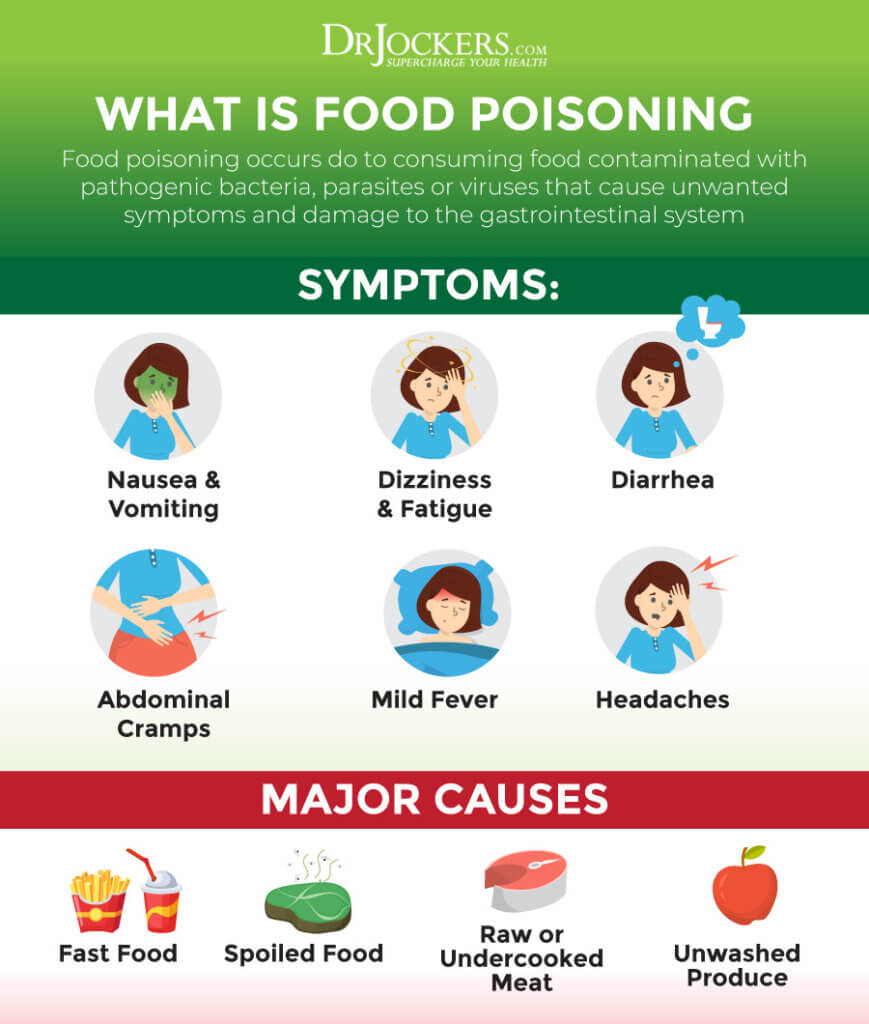
High-Mercury Fish
Mercury has toxic effects on everyone and pregnant women should be particularly careful. The American Pregnancy Association recommends that pregnant women avoid high-mercury fish, such as shark, king mackerel, tilefish, swordfish, and canned, chunk, light tuna (11).
According to a 2008 study published in Current Opinions in Pediatrics, mercury in fish can interfere with neurodevelopment (14). It may increase the risk of brain damage and developmental delays. According to the American Pregnancy Association, wild-caught salmon, wild-caught sardines, and pure tuna are okay to eat by pregnant women (11).

Raw Eggs
The American Pregnancy Association recommends avoiding raw eggs as well (11). Raw eggs carry the potential exposure to salmonella. According to a 2010 study published in Canadian Family Physician, raw and undercooked eggs can increase the risk of a Salmonella infection. Salmonella infection may cause stomach cramps, nausea, vomiting, diarrhea, and other gastrointestinal symptoms (15). In about 4 percent of cases, it may also cause intrauterine sepsis.
It’s important to note that we are not only talking about raw and undercooked eggs, but also homemade foods that may include raw or undercooked eggs, including raw cookie dough, homemade ice-cream, homemade custard, mayonnaise, Hollandaise sauce, Caesar and other salad dressings, and eggnog. Commercially produced counterparts of these foods tend to use pasteurized eggs that do not increase your risk of salmonella, however, it is important to be careful, especially if you are shopping at a farmer’s market or local artisans.
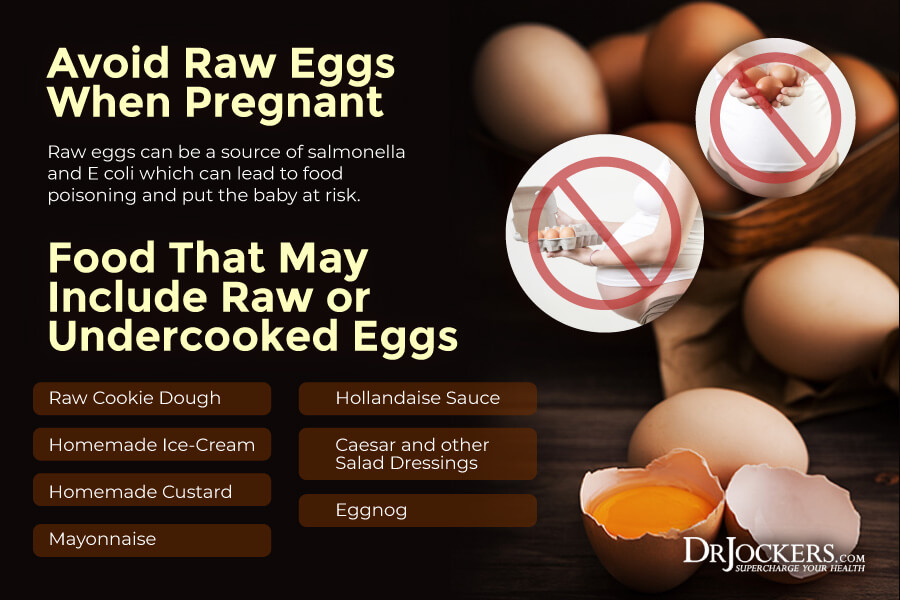
Trans Fats and Processed Vegetable Oils
You have probably noticed that many of these foods on this list are not the best for the general population either. Avoiding trans, or hydrogenated fats and processed vegetable oils is important for anyone, but it’s particularly critical during your pregnancy.
According to a 2014 study published in the American Journal of Clinical Nutrition, trans fats can affect fetal growth (16). Trans fats can increase the bad cholesterol levels of pregnant women and higher trans fat intake can also increase the weight of the baby that may negatively affect both pregnancy and labor.
It’s important that you not only avoid cooking or baking with trans fats and processed vegetable oils at home but also avoid foods that are high in trans fats and processed oils, such as deep-fried foods, fast food, frozen pizza, some commercial baked goods, and many processed foods. Home-cooked meals in healthy fats is always the best option.
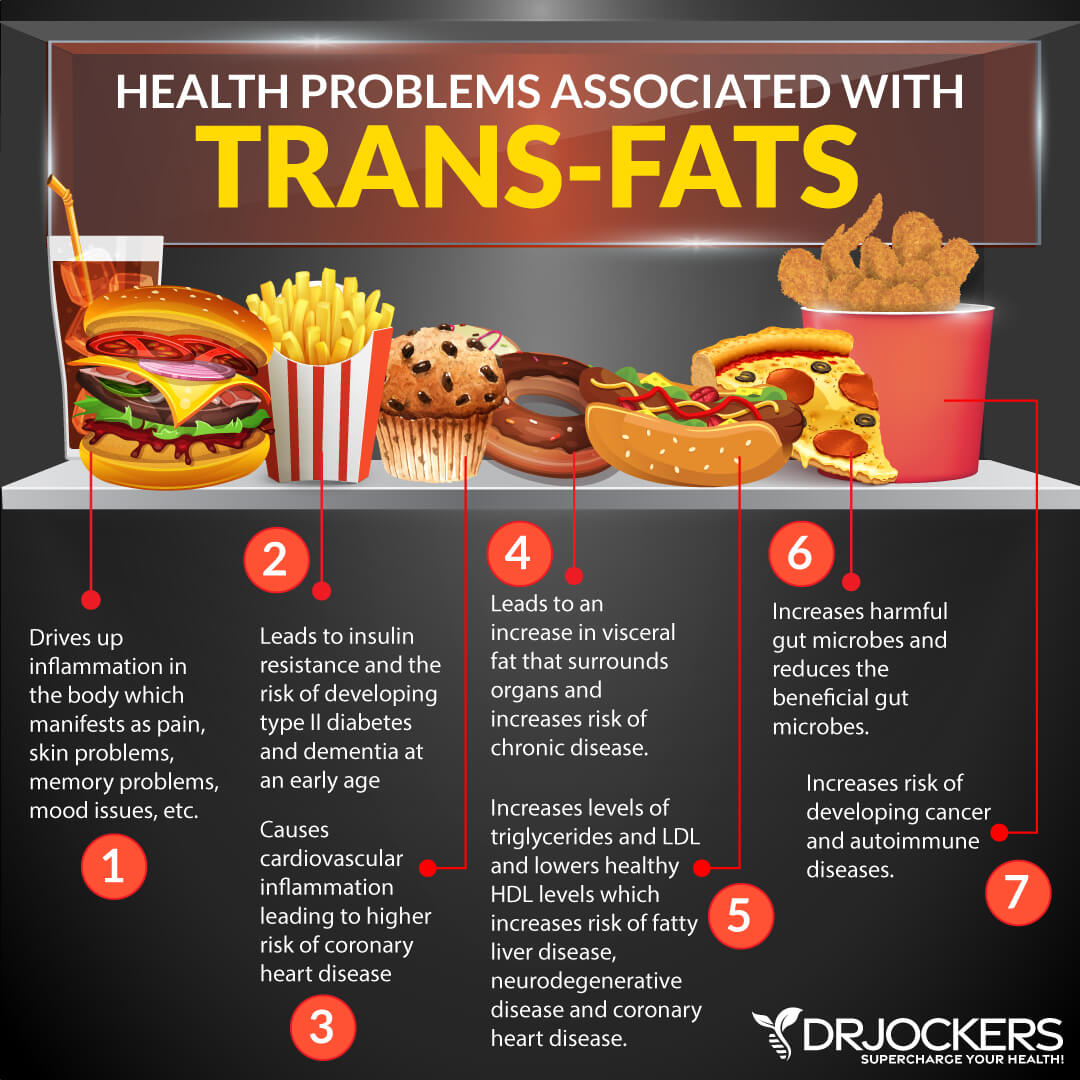
Alcohol
It’s common knowledge that alcohol should be avoided during pregnancy. According to a 2019 study published in the Journal of Studies on Alcohol and Drugs, no amount of alcohol has been proven to be safe during pregnancy (17). Prenatal exposure to alcohol can negatively affect the healthy development of the unborn child. It can lead to lower birth weight and poor cognitive development. Depending on the amount, it may cause developmental disorders or Fetal Alcohol Syndrome.
Under ideal circumstances, you stop drinking even before pregnancy while planning and trying to get pregnant. Ideally, during this time, your partner also abstains from alcohol. However, unplanned and unexpected pregnancies happen. If you consumed alcohol before you found out you were pregnant, it is important that you stop drinking completely right away to avoid any complications. Avoiding alcohol during breastfeeding is just as critical.
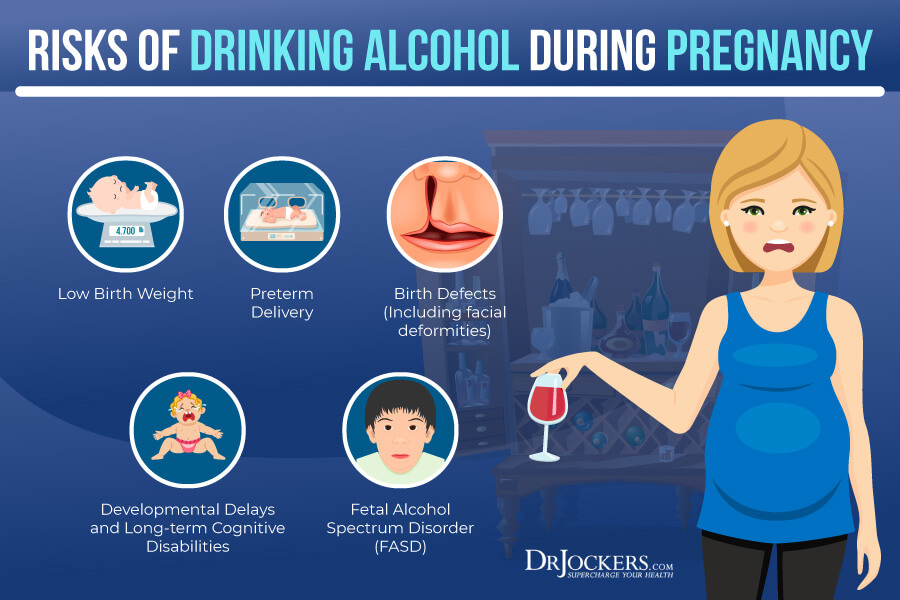
Caffeine
Though coffee, green tea, and black tea can certainly offer some health benefits, it is important to keep your coffee, caffeinated tea, and overall coffee intake low. According to a 2013 study published in Canadian Family Physician, drinking over 300 milligrams of caffeine can be problematic (18).
Though it doesn’t seem to contribute to serious health effects, high caffeine intake, especially during the first trimester can increase the risk of miscarriage. Since caffeine is a diuretic, it helps to release fluids from your body that can increase the risk of dehydration and calcium loss as well. Consuming 1 to 2 cups of caffeinated drinks a day does not seem to affect your and your baby’s health.
Removing caffeine completely is not a problem and can be beneficial, however, if you limit your consumption to no more than 1 to 2 cups a day. Choose high-quality coffee or tea and avoid energy drinks, sodas, chocolate, and other caffeinated foods or drinks. If you feel that caffeine makes you too jittery or experience any negative effects, reduce your dose or stop completely.
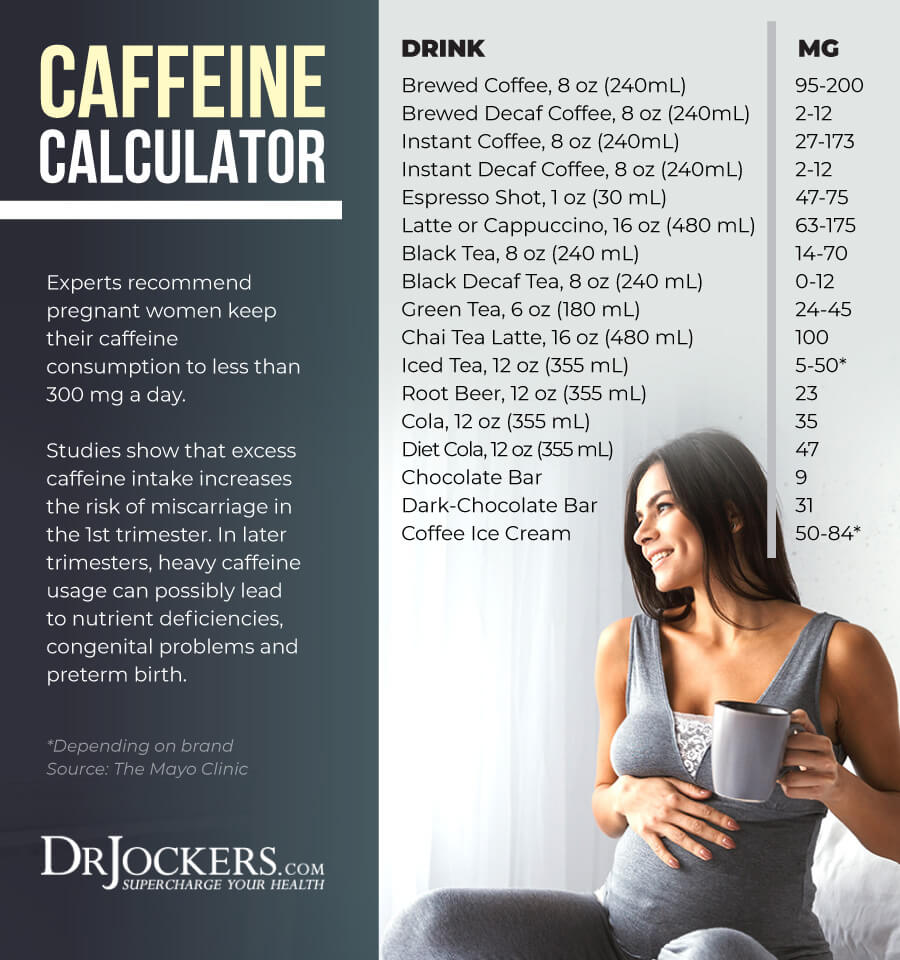
Gluten
Gluten is a protein that is found in certain grains, including wheat, rye, spelt, and barley, and foods and drinks made with these grains, including bread, pasta, baked goods, and beet. Gluten is highly inflammatory and many people are sensitive to it. Additionally to rampant gluten intolerance, Celiac disease is a common autoimmune disease. People with Celiac disease cannot eat or be exposed to gluten because it affects their small intestines and leads to a variety of chronic symptoms.
According to a 2020 study published in Science Reports, consuming gluten during pregnancy can increase the risk of childhood Celiac disease (19). It is important that you remove gluten from your diet, especially if you have gluten intolerance or Celiac disease. Gluten can hide in many foods, so read your labels carefully and ask for gluten-free options when eating at a restaurant or a friend’s or family’s home.
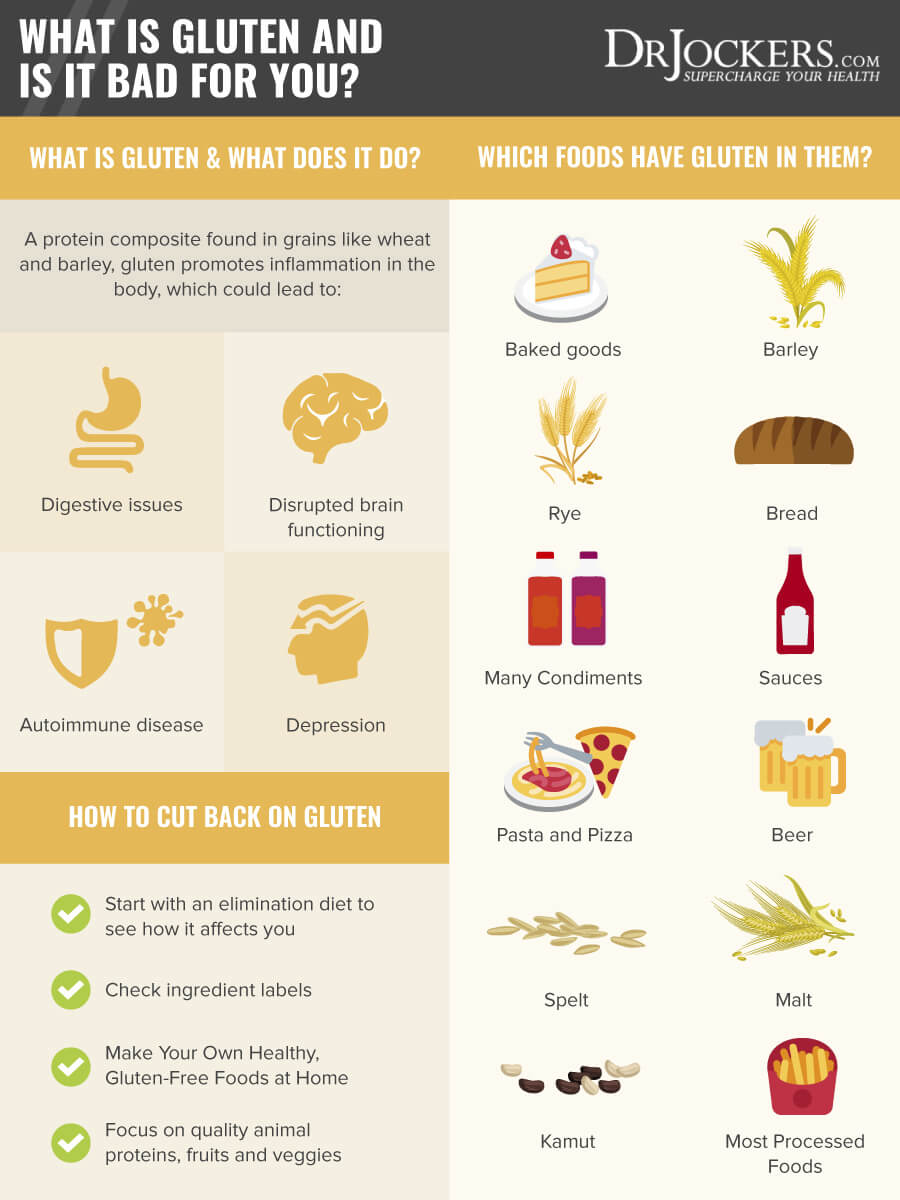
The Pregnancy Diet Plan
Now that you know what foods you should avoid, it’s time to learn what you can and should eat during your pregnancy. The general rule of thumb is to eat a nutrient-dense, balanced diet full of whole food macro- and micronutrients, however, it is important that you understand some specific recommendations. This is what I recommend as a pregnancy diet plan.
Choose Organic When Possible
I recommend that you choose organic foods whenever possible, accessible, and affordable. According to a 2016 study published in Environmental Health Perspective, following an organic diet and decreasing pesticide and glyphosate exposure during pregnancy contributed to a lower risk of health effects such as hypospadias during pregnancy (20).
Organic is always the best option and you should aim for a fully or nearly organic diet. If you cannot afford or for any reason not able to follow a completely organic diet, make sure to follow the guidelines of the Dirty Dozen and Clean Fifteen and always choose organic if a food is on the Dirty Dozen list.
If you are eating non-organic food, washing well and peeling are helpful practices. Non-organic foods are full of pesticides, chemicals, or hormones that can negatively affect you and your growing baby’s health.
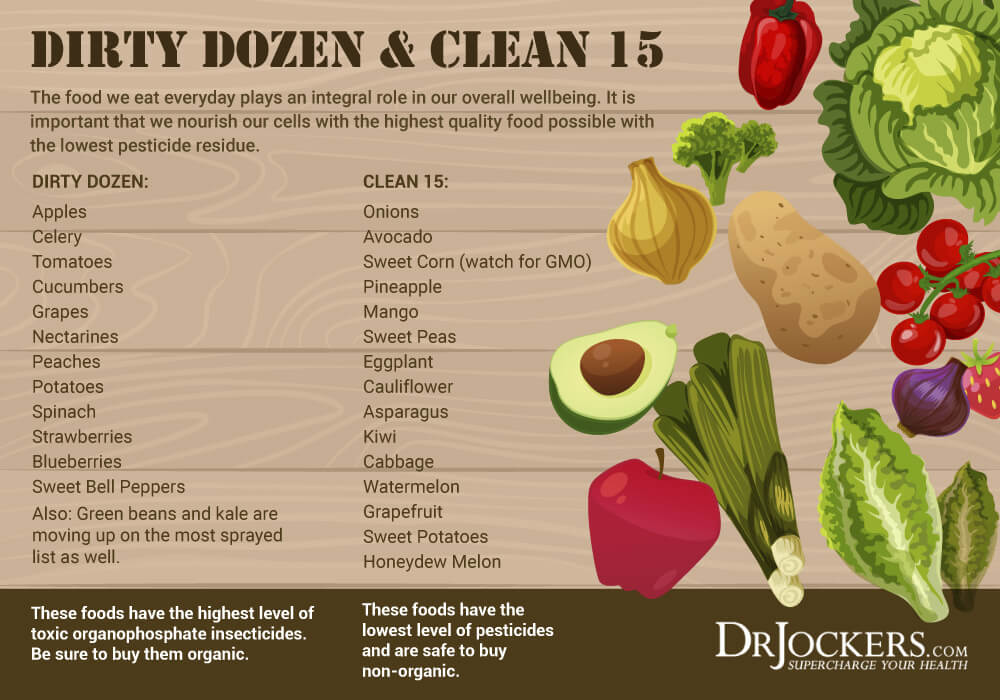
Healthy Fats
Eating plenty of healthy fats is particularly important during pregnancy. Healthy facts are particularly important for brain and neurological development and functioning. According to a 2016 study published in Developmental Psychobiology, an adequate healthy fat intake is important for behavioral functioning and child temperament (21).
Inadequate fat intake can interfere with behavioral, mental, and emotional development. Healthy fat sources include avocados, coconut oil, coconut butter, pasture-raised butter and ghee, nuts, and seeds.
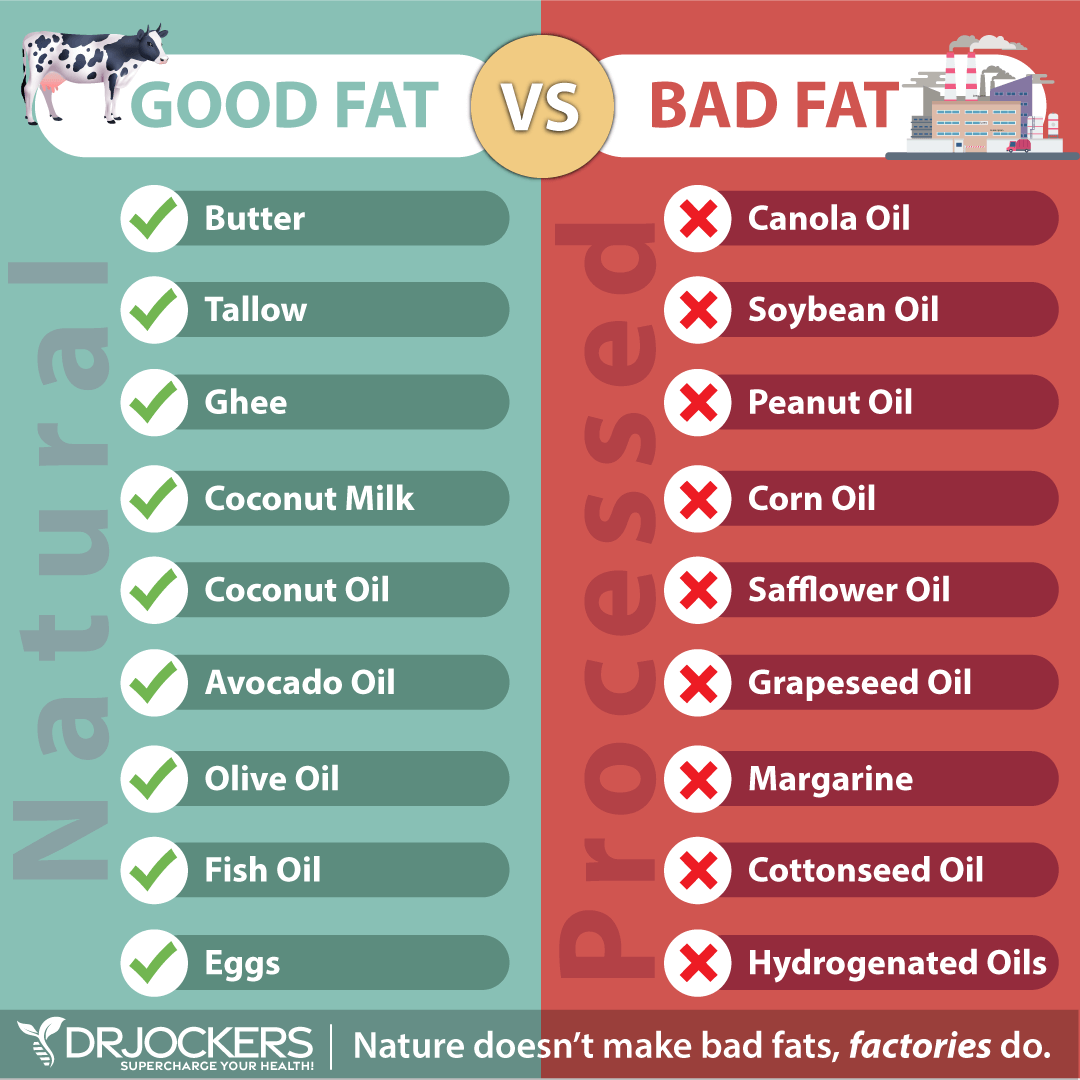
Prioritize Protein
Pregnant women need more protein than women who are not pregnant. Protein is important for fetal tissue, breast and uterine tissue, and fetal development. According to a 1029 study published in Current Development in Nutrition, adequate-protein intake may also increase both maternal and fetal insulin sensitivity (22).
The American Pregnancy Association recommends 75 to 100 grams of protein per day for pregnant women (23). Healthy protein sources include pasture-raised beef, grass-fed and free-range poultry and eggs, wild-caught fish, wild boar, legumes, nuts, and seeds. Make sure to avoid any raw, undercooked, or cured meat or fish and raw or undercooked eggs.
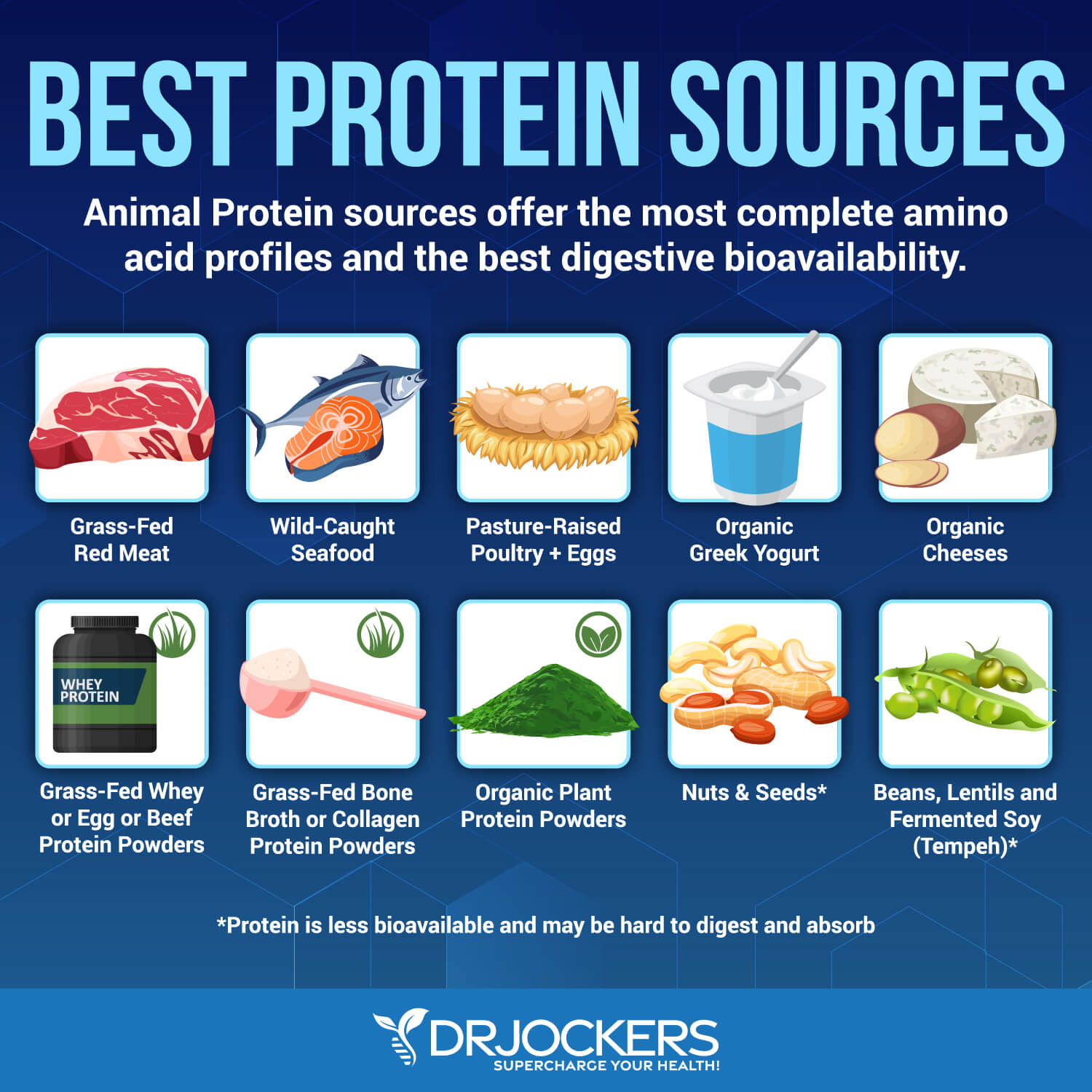
Eat Healthy Carbs
Pregnancy is not the time to seriously limit any macronutrients. However, it is important that you choose healthy sources of carbohydrates and keep your overall glycemic index low.
According to a 2011 study published in the Cardiovascular Medicinal Journal, a high-glycemic index and high sugar diet can increase the risk of gestational diabetes, while a lower glycemic index diet can have a positive impact on maternal blood glucose production, fetal and placental insulin, and glucose regulation, insulinemia, fetal growth, offspring adiposity, and birth weight (24).
On the other hand, a 2019 case-control study published in Nutrients has found that the type of carbohydrates you eat during pregnancy matters (25). Choosing unhealthy carbohydrates was associated with small for gestational age (SGA) babies, however, eating healthy carbs showed a reduced risk of such issues.
Avoid sugar, refined carbs, gluten-containing grains, and any carby junk food. Minimize grains, especially gluten-containing grains. I recommend that you eat sweet potatoes, carrots, beets, squash, fruits, beans, lentils and quinoa.
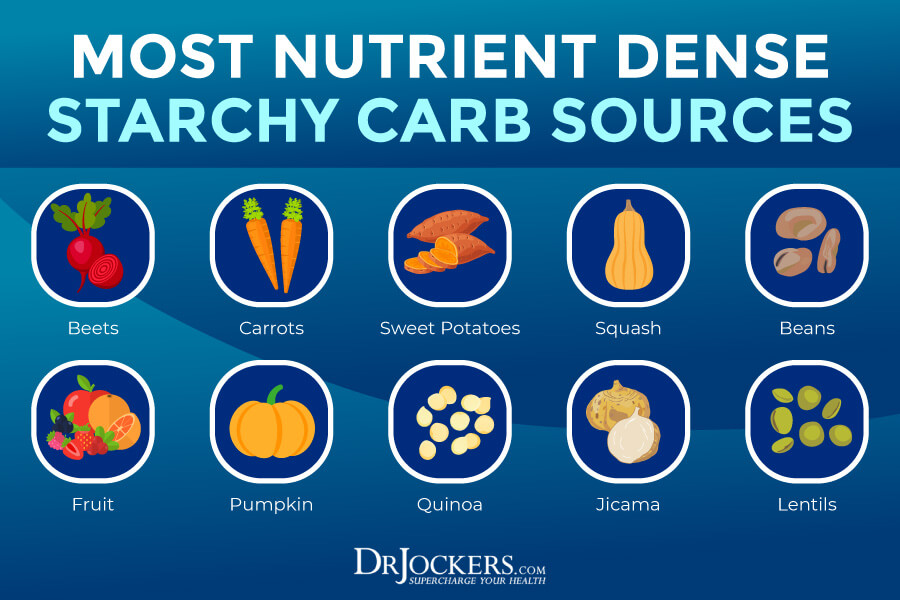
Filtered Water
Staying well hydrated throughout your pregnancy is critical. According to a 2020 study published in BMC Pregnancy Childbirth, inadequate hydration can cause dehydration that can result in both maternal and birth outcomes, while proper hydration may be linked to fewer pregnancy complications and better maternal, infant, and birth outcomes (26).
However, drinking clean water and avoiding tap water that’s filled with toxic chemicals is important. I recommend that you invest in a high-quality water filtration system and drink filtered water. To avoid further toxicity from plastics, avoid plastic bottles and choose mason jars, glass bottles, aluminum bottles, glasses, or ceramic mugs instead.
I recommend systems like Aquatrue or the Berkey system for low-cost filtration. The best water is the UltraLux Triple Action Hydrogen Water Machine which is what I use at home as it is powered by molecular hydrogen which reduces oxidative stress in the body and improves immune function. Add a slice of lime for some extra flavor.
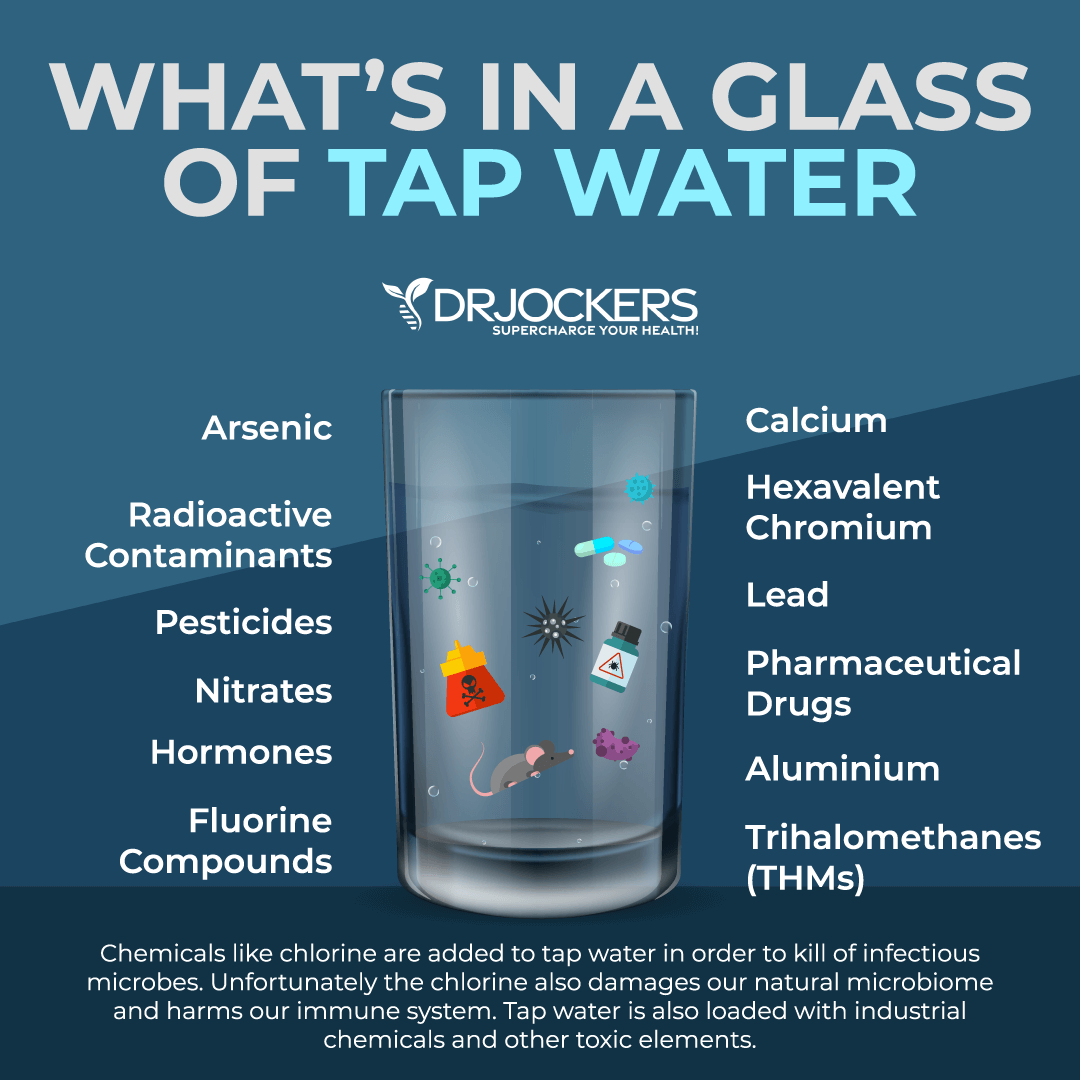
Eat Every 3-4 Hours Until Satiated
Pregnancy increases your nutritional and caloric needs and may increase your hunger as well. Eating every 3 to 4 hours until you are satiated is important to meet your nutritional needs and maintain steady blood glucose levels. It may also reduce negative symptoms of pregnancy. This is especially important as you get into the 3rd trimester as your stomach will be compressed by the growing baby and you may not be able to consume larger meals.
According to a 2001 study published in the American Journal of Epidemiology, eating frequency and patterns should also be part of pregnancy nutrition (27). Eating regularly with breakfast, lunch, dinner, and snacking in-between with linked to reducing the risk of complications and preterm delivery. I recommend that you eat every 3 to 4 hours and eat until you are satiated. Even if you are dealing with morning sickness or not feeling hungry, do not skip meals, and try to eat something regularly.
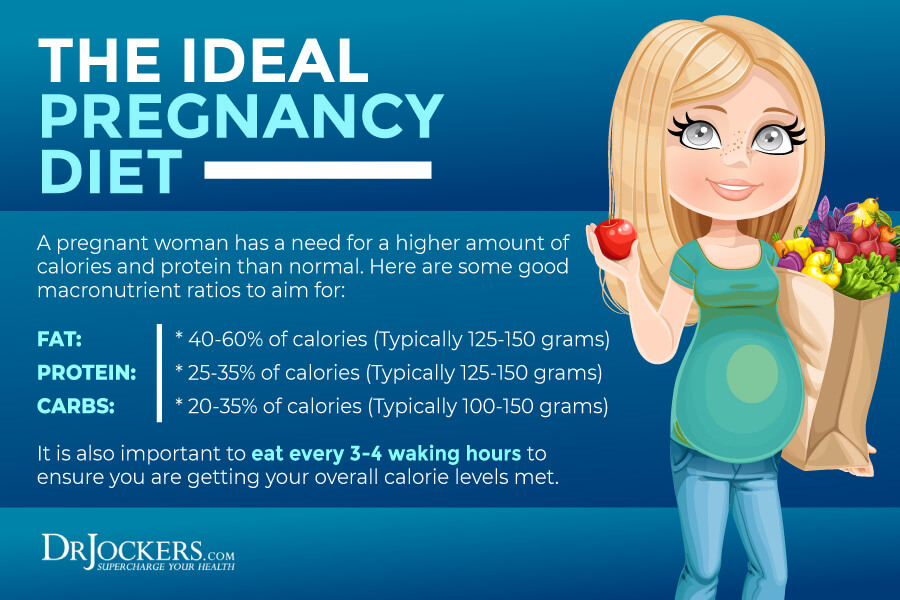
Herbal Teas for Pregnancy
Drinking herbal teas may offer some health benefits for your pregnancy and health. Here are the herbal teas I recommend for pregnancy.
Ginger Tea
Ginger is known for its wonderful benefits for digestion, nausea, and morning sickness. It is particularly helpful during your first trimester. According to a 2018 study published in Foods, ginger rhizome can lower nausea and vomiting during early pregnancy (28).
I recommend drinking ginger tea to relieve symptoms of morning sickness and nausea. Generally, it is safe to drink up to 4 cups of ginger tea a day while pregnant, however, listen to your body.
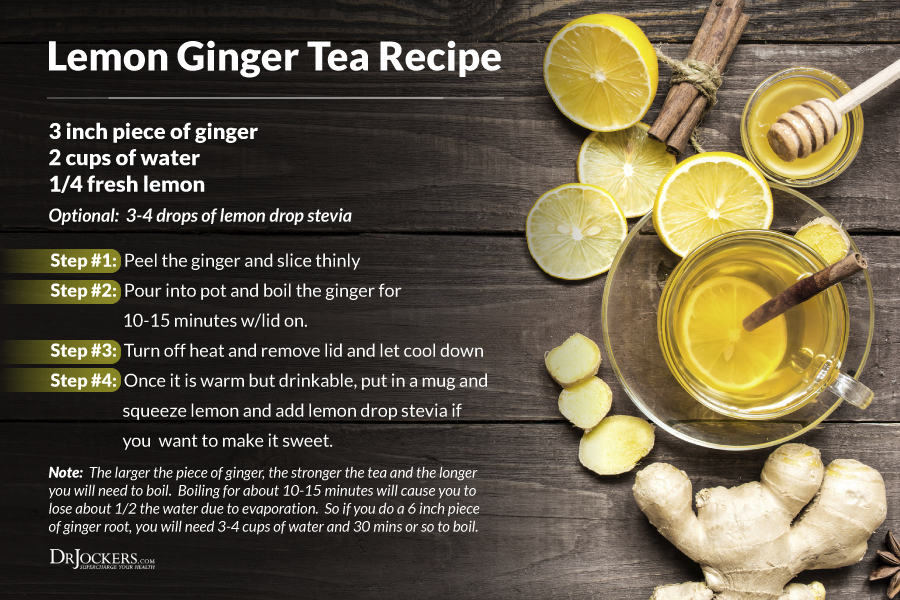
Chamomile
Chamomile tea is great for nausea and relaxation and it is safe to take during pregnancy. Chamomile is a carminative herb that contains chamazulene, an aromatic compound that possesses anti-inflammatory, analgesic and antispasmodic properties.
According to a 2010 study published in Molecular Medicine Reports, chamomile is a great medicinal herb that can reduce gastrointestinal issues, inflammation, and insomnia (29). I recommend this Secrets of Tea – No to Morning Sickness Tea.

Red Raspberry Leaf Tea
Red raspberry leaf tree is a great option that helps the womb prepare for childbirth. According to a 1999 study published in the Australian College of Midwives Incorporated Journal, red raspberry leaf tea may help to shorten labor and may reduce pre- and post-term gestation (30).
One cup a day starting during the second trimester is often recommended. I recommend Traditional Medicinals Red Raspberry Leaf Herbal Tea.
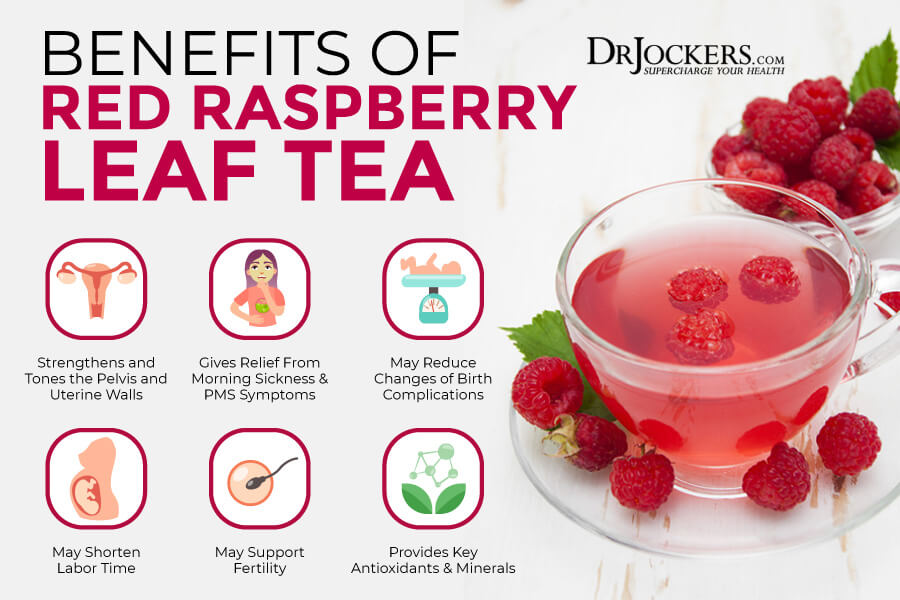
Pregnancy Tea
There are various pregnancy teas out there on the market with herbs that can support pregnancy or relieve pregnancy-related symptoms, such as morning sickness. I’ve already talked about the benefits of ginger tea during pregnancy.
Rooibos is another great herb that can be beneficial in a pregnancy tea. According to a 2016 study published in Integrative Pregnancy Inside, ginger is effective for nausea and vomiting during pregnancy (31). According to a 2017 study published in the South African Journal of Botany, rooibos supports female fertility, aids the thickening of the uterine wall, helps egg implantation, and is safe during pregnancy (32). I recommend Pink Stork Morning Sickness Tea with a delicious organic rooibos tea with ginger and peach flavor.
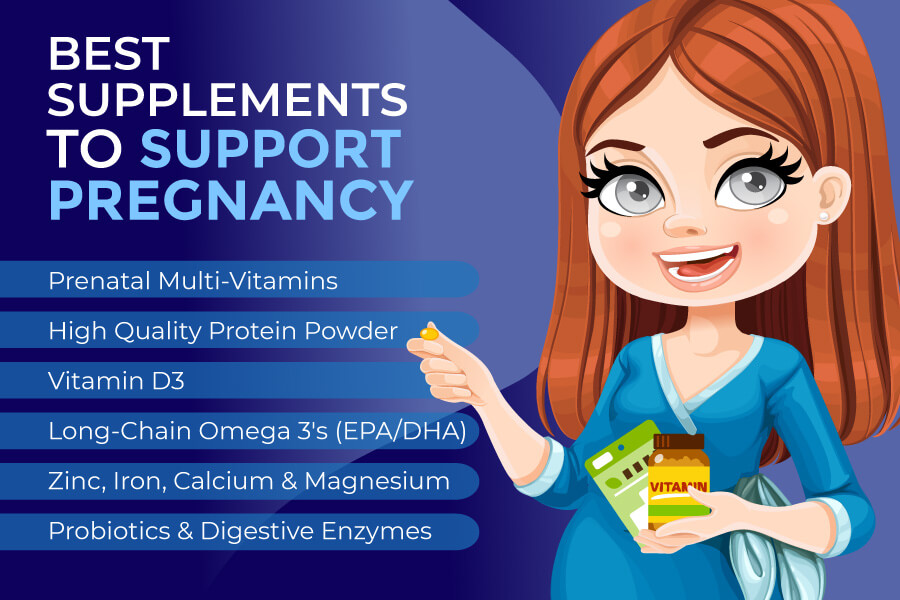
Best Pregnancy Supplements
Along with eating a healthy diet and drinking supportive herbal tea, it is critical that you take supplements that support a healthy pregnancy and a growing baby. Here are the best pregnancy supplements I recommend.
Prenatal Vitamins
First and foremost, it is critical that you take a high-quality prenatal vitamin supplement. Prenatal vitamins are multivitamin supplements that are specifically formulated to be used during pregnancy to help the growing baby and the mother. Ideally, you’d start taking prenatal vitamins before conception and continue it throughout pregnancy and breastfeeding. Prenatal vitamins can help to add extra micronutrients to your body and support gaps in your diet. They may help to lower the risk of preterm birth and preeclampsia. Some of the top nutrients in prenatal vitamins include folate, vitamin B12, and choline.
According to a 2010 study published in the Cochrane Database and Systemic Review, folate supplementation is associated with a lower risk of birth defects (33). According to a 2017 systematic review and meta-analysis published in the American Journal of Epidemiology, vitamin B12 deficiency may increase the risk of preterm birth and low birth weight (34).
According to a 2017 randomized, double-blind, controlled feeding study published in The FASEB Journal, choline supplementation during the third trimester may support brain health and increase infant information processing speed (35). Since the majority of our population have methylation issues, it is important that you choose prenatal vitamins with methylated forms of folate/B12.
Methylated forms of B vitamins are more available to your body making it easier to access all the benefits. We offer the Seeking Health Prenatal Essentials that is in an easy chewable form and contains the key nutrients in their proper form.
High-Quality Protein Powder Prenatal Protein Powder
Getting enough protein is incredibly important during pregnancy (22, 23). However, many women struggle with meeting their protein needs. This is why I recommend a high-quality prenatal protein powder. I recommend Optimal Prenatal Protein Powder.
This prenatal protein powder also includes essential B complex vitamins, vitamin A, vitamin C, Co Q10, red raspberry leaf tea powder, trace minerals, and betaine HCl to support a healthy pregnancy. This protein powder is an excellent addition to shakes and smoothies. It’s easily digestible and perfect if you are experiencing digestive issues and need something simple.
Vitamin D
According to the World Health Organization (WHO), vitamin D deficiency is a serious problem in many parts of the world and is often linked to increased risk of gestational diabetes mellitus, pre-eclampsia, certain tissue-specific disorders, and preterm birth (36). Meeting your vitamin D needs through sun exposure and eating vitamin D-rich foods, like fatty fish, egg yolk, and liver alone is usually not possible, especially during pregnancy making supplementation necessary.
According to a 2018 review published in the British Medical Bulletin, vitamin D supplementation can reduce obstetric outcomes, pregnancy complications, and childhood outcomes (37). Vitamin D supplementation may lower the risk of pre-eclampsia, low birth weight, gestational diabetes, low fetal size, poor body mineralization, poor body composition, preterm birth, and childhood asthma (36, 37).
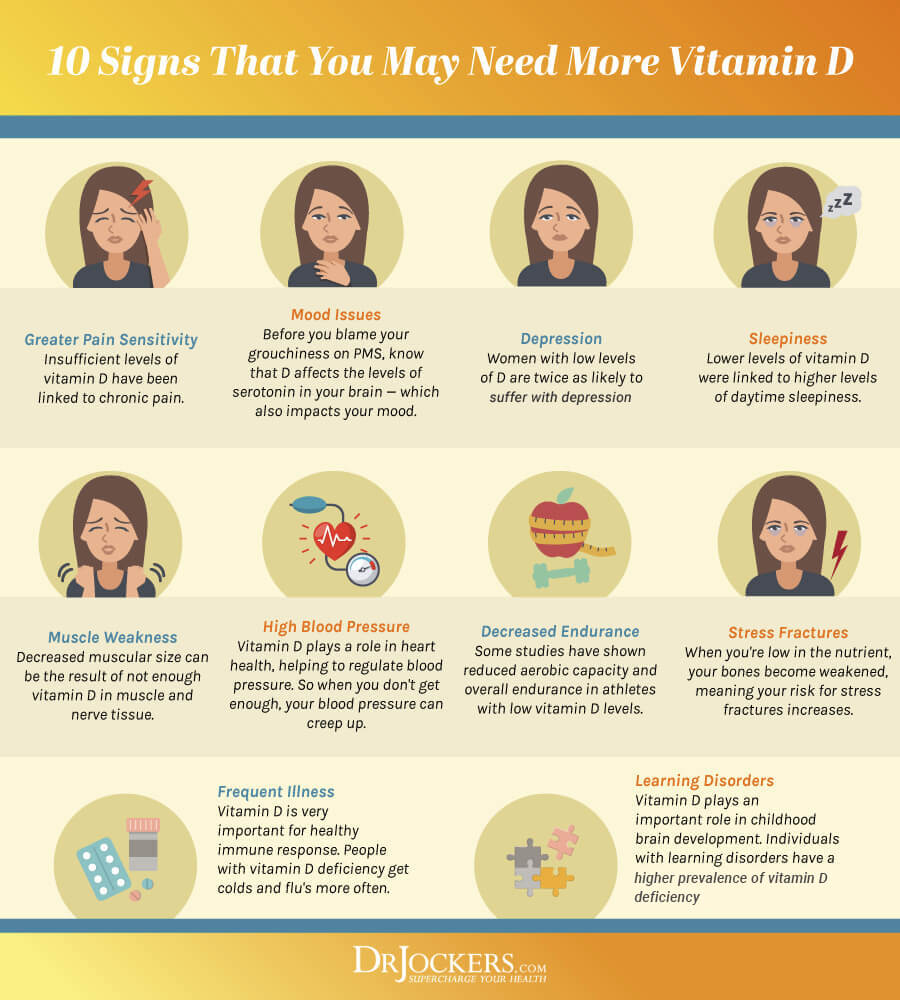
Omega 3’s (EPA/DHA)
According to a 2010 Review in Obstetrics and Gynecology, omega 3 fatty acids are critical for fetal development as they are building blocks of the brain and the retina (38). Not getting enough omega 3s can have adverse effects on the baby’s development and pregnancy.
While eating foods that are rich in omega-3 fatty acids, such as low-mercury, wild-caught fish and seafood, algae, chia seeds, flax seeds, and hemp seeds is important, supplementing with Omega 3 supplements is critical to support a healthy pregnancy, brain development, healthy growth, and organ development. I recommend Pro Omega for omega 3 supplementation.
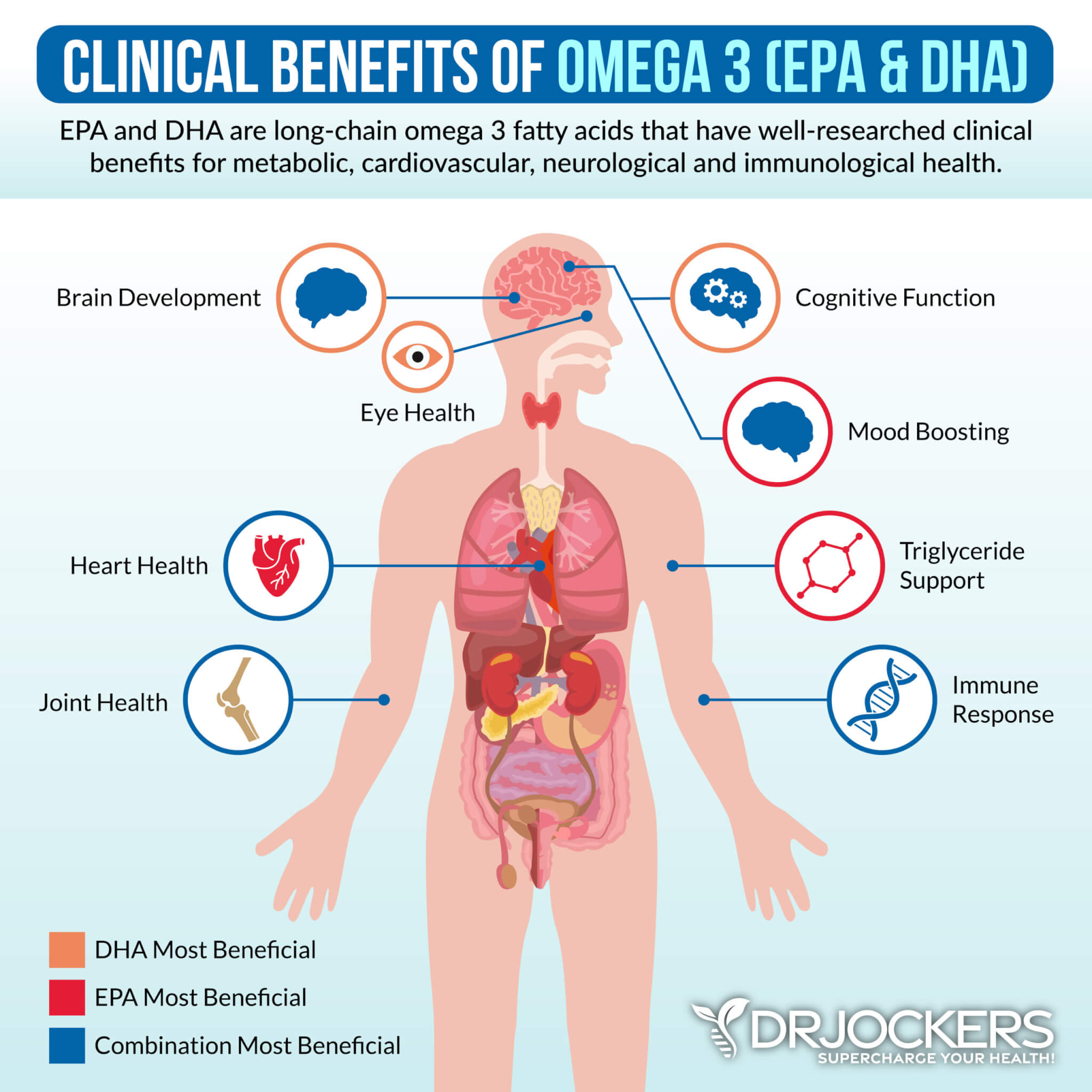
Zinc
While eating foods that are rich in zinc, such as meat shellfish, nuts, seeds, beans, mushrooms, spinach, and broccoli, it is often not enough. Most people are actually deficient in zinc. Increased nutrient needs during pregnancy may also increase your risk of zinc deficiencies. Supplementation with zinc is beneficial for both your and your baby’s health.
According to a 2012 systematic review published in Pediatric and Perinatal Epidemiology, deficiencies in zinc can cause reduced birth weight, congenital malformation, intrauterine growth retardation, fetal loss, preterm labor, prolonged labor, and post-term delivery, while supplementation with zinc can reduce the risk of these complications, as well as infections during pregnancy (39).
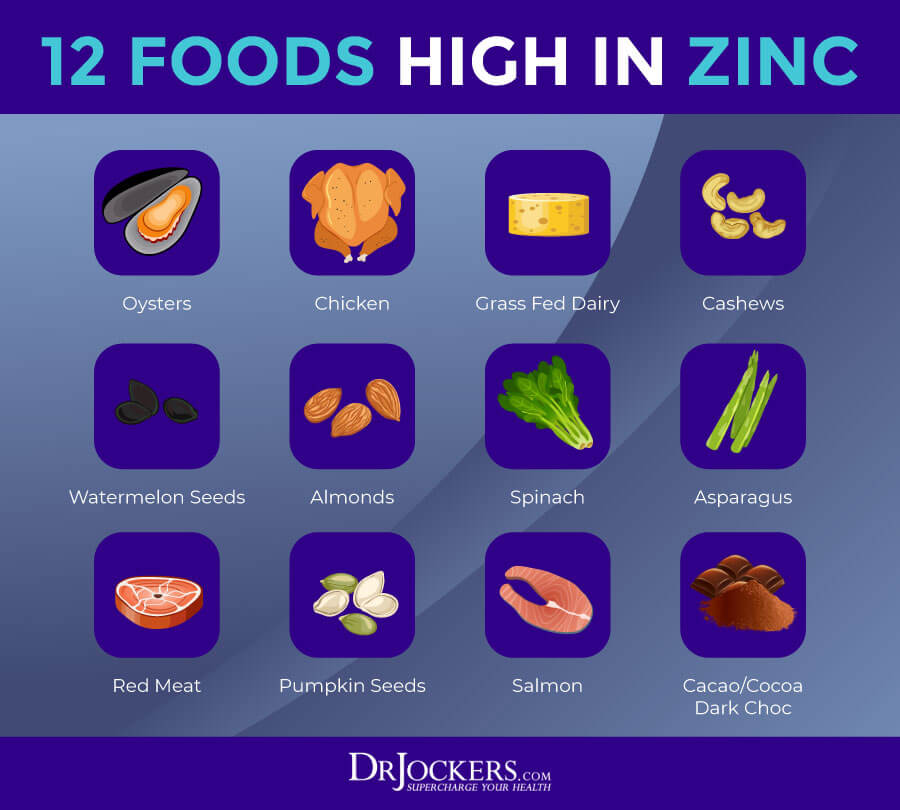
Probiotics
Probiotics support a healthy gut microbiome balance, and your gut microbiome health is critical for all areas of your health, including pregnancy and your growing baby’s health. It’s not surprising that many women crave sauerkrauts and other fermented foods during their pregnancy. According to a 2019 double-blind, randomized controlled pilot trial published in Trials, taking probiotics during pregnancy may help to reduce postpartum depression and postpartum anxiety (40).
According to a 2016 double-blind randomized controlled trial, taking probiotics can support maternal health during pregnancy and can also lower the risk of eczema and allergies during infancy (41). A 2018 systematic review and meta-analysis published in BMC Pregnancy Childbirth has also found that taking probiotics and prebiotics during pregnancy can reduce the risk of adverse effects during pregnancy and preterm birth (42). I recommend taking Nexabiotic for daily supplementation.
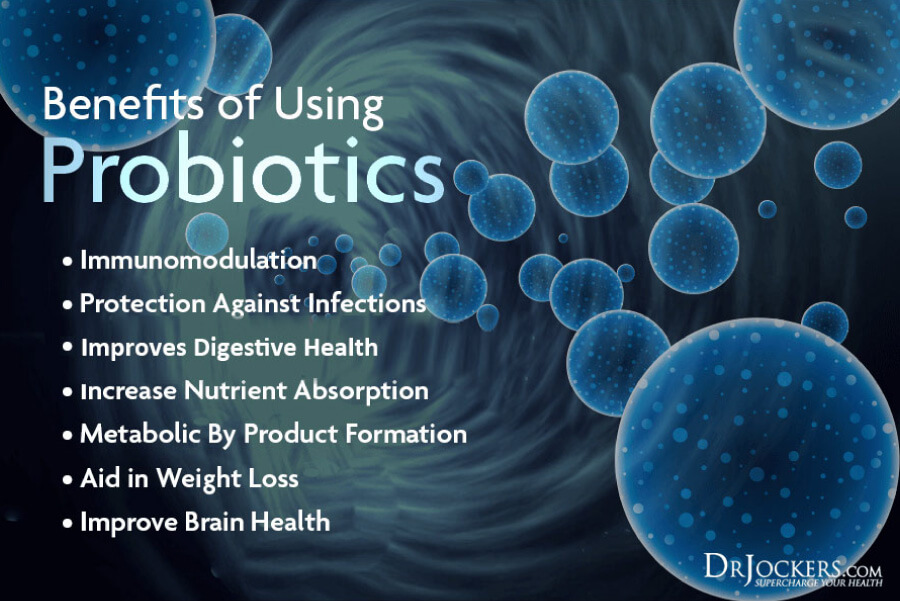
Digestive Enzymes
According to a 2018 study published in the Annals in Gastroenterology, the physiological changes of pregnancy can cause nausea, vomiting, constipation, heartburn, and in some cases liver issues (43). Experiencing morning sickness during the first trimester is normal. Some women continue to experience nausea and digestive issues throughout their entire pregnancy, but in most women, heartburn becomes an issue as the pregnancy unfolds.
Digestive enzymes can help. They can reduce indigestion, heartburn, and acid reflux. They can support the absorption of nutrients, improve blood flow, and support healthy tissue development. I recommend Super D-Zyme before meals.
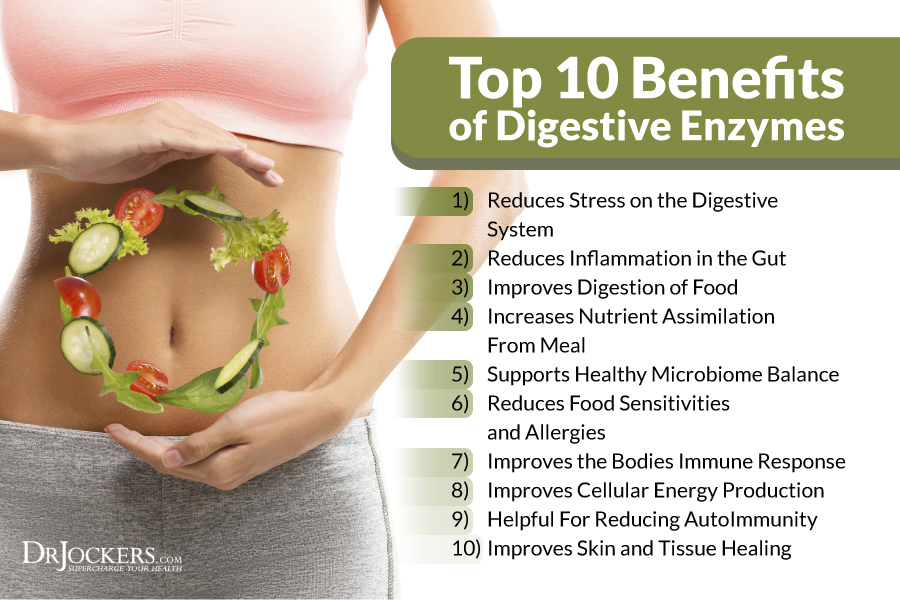
Calcium and Magnesium
Magnesium and calcium are important for the bone development of the baby. Calcium and magnesium can also help during birth. Magnesium helps to relax your muscles, while calcium supports contractions. They help to prevent premature contractions and support birth at the right time.
According to a 2014 study published in the Journal of Clinical Diagnostic Research, calcium and magnesium deficiency can cause pre-eclampsia that may cause complications or even fetal mortality (44). According to a 2019 study, supplementing with magnesium and calcium along with zinc and vitamin D supplementation during pregnancy can reduce inflammation, oxidative stress, gestational diabetes, and poor pregnancy outcomes (45). I recommend CalMag Support during pregnancy.
What Supplements to Avoid
While an adequate diet and supplementation are important during pregnancy, certain supplements are not recommended while pregnant because they can cause complications and increase the risk of miscarriage or preterm labor. Here are the supplements you should avoid during pregnancy.
Anti-Microbial Herbs
Do not take any supplements with anti-microbial herbs, such as berberine, oregano oil, clove, wormwood, or black walnut. These herbs can cross the placenta, harm the developing baby, and may increase the risk of miscarriage.
According to a 2010 study, wormwood, for example can interfere with implantation and cause mid-term miscarriage (46). While getting high clinical doses could be a problem, eating some garlic or using dried oregano in your dishes is fine.
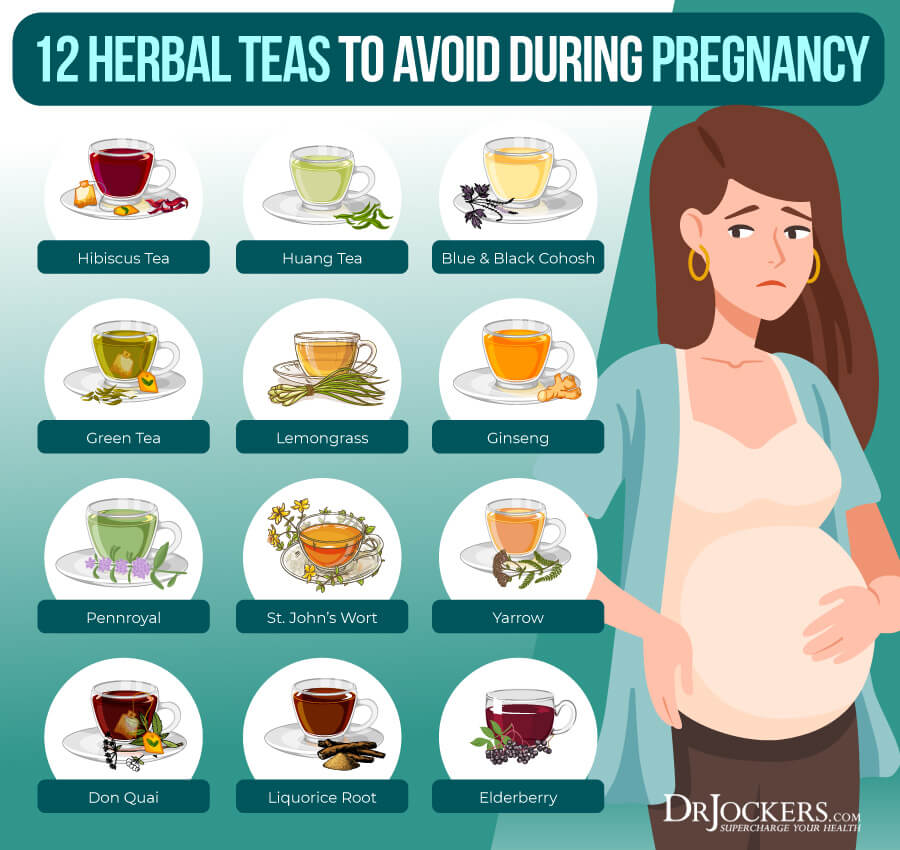
Herbs That Enhance Liver Detoxification
Using herbal supplements that enhance liver detoxification, such as fennel, dandelion, yarrow, cilantro, burdock herbal supplements should also be avoided. Just like anti-microbial herbs, these liver detoxification herbs can cross the placenta, harm the growing baby, and cause premature birth or miscarriage. One exception is milk thistle, which when taken in lower doses can be a great support for digestive and liver health while pregnant.
According to the 2003 study in Birth Defects Research, Part B, Developmental and Reproductive Toxicology, yarrow can stimulate contractions. This can cause problems, like miscarriage or preterm labor (47). Again, getting clinical doses could be a problem but eating some of these as food and using them in your dishes as spices is harmless.
Herbs That Modulate Hormones
Herbs, like dong quai, black cohosh, and red clover, that modulate hormones, should also be avoided. They can increase the risk of miscarriage and premature birth. According to a 2006 study published in the Canadian Journal of Clinical Pharmacology, black cohosh should be avoided, especially during the first trimester. It can cause uterine contractions and miscarriage (48).
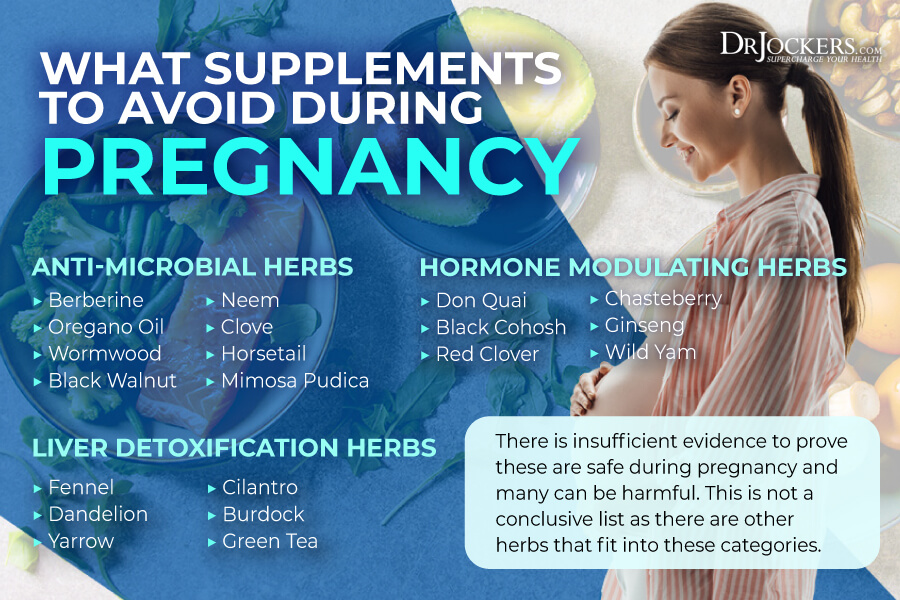
Final Thoughts
Following certain nutrition principles and a healthy pregnancy diet is important for growing a healthy baby, a healthy pregnancy, and your health as an expecting mother. Follow my tips and nutrition principles on how to eat a nutrient-dense, healthy pregnancy diet to ensure a healthy pregnancy and a healthy baby.
If you want to work with a functional health coach, I recommend this article with tips on how to find a great coach. Our website offers long-distance functional health coaching programs with our world-class team of health coaches. For further support with your health and other goals, just reach out—our fantastic coaches are here to support your journey.
Inflammation Crushing Ebundle
The Inflammation Crushing Ebundle is designed to help you improve your brain, liver, immune system and discover the healing strategies, foods and recipes to burn fat, reduce inflammation and Thrive in Life!
As a doctor of natural medicine, I have spent the past 20 years studying the best healing strategies and worked with hundreds of coaching clients, helping them overcome chronic health conditions and optimize their overall health.
In our Inflammation Crushing Ebundle, I have put together my very best strategies to reduce inflammation and optimize your healing potential. Take a look at what you will get inside these valuable guides below!
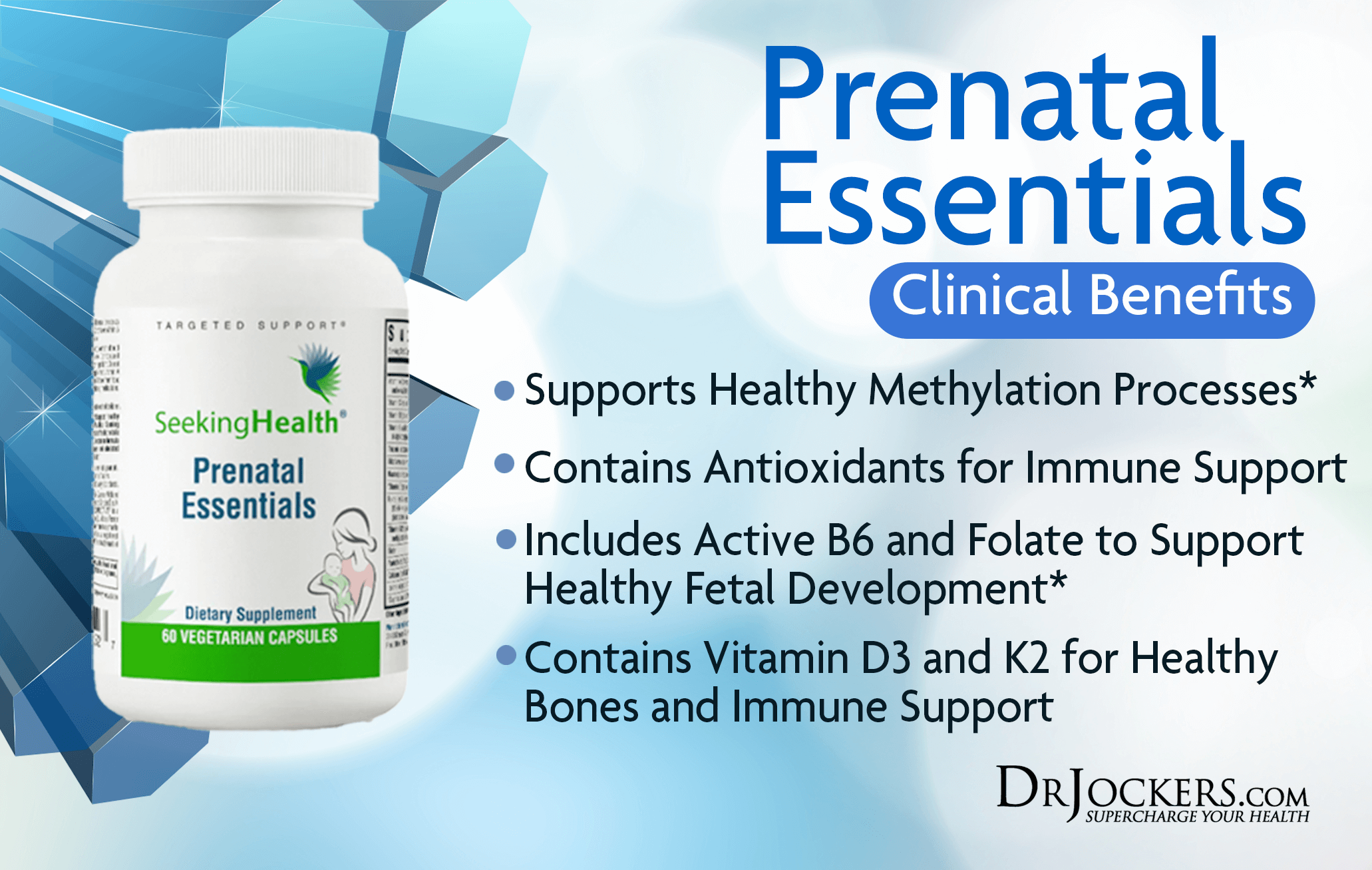






Awesome Article…. sharing with friends!
Thanks Angela!
So a keto diet is not recommended during pregnancy?